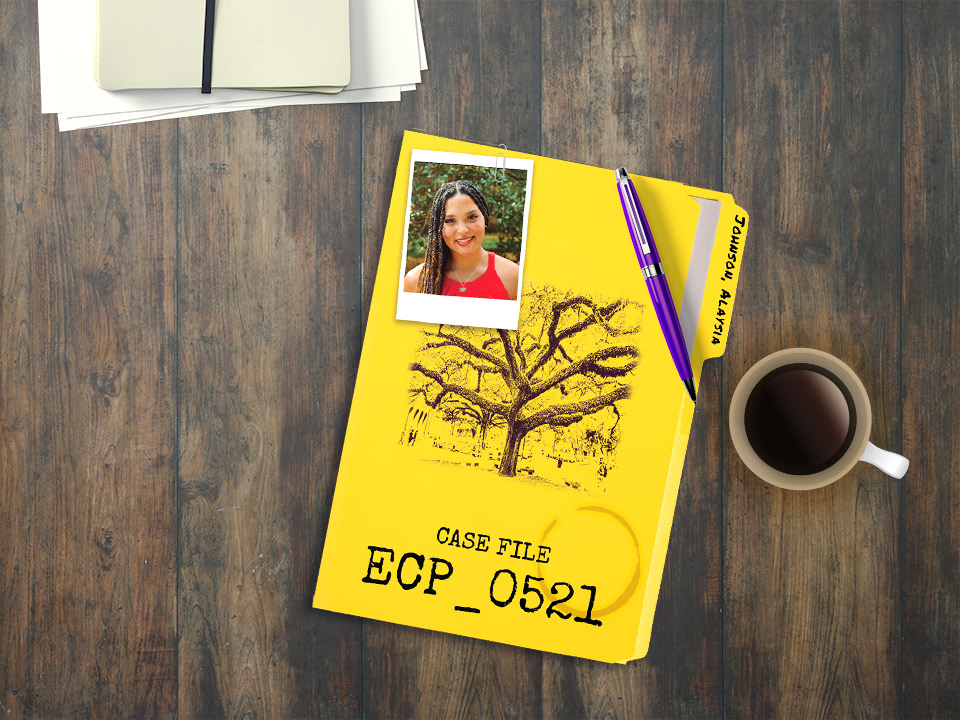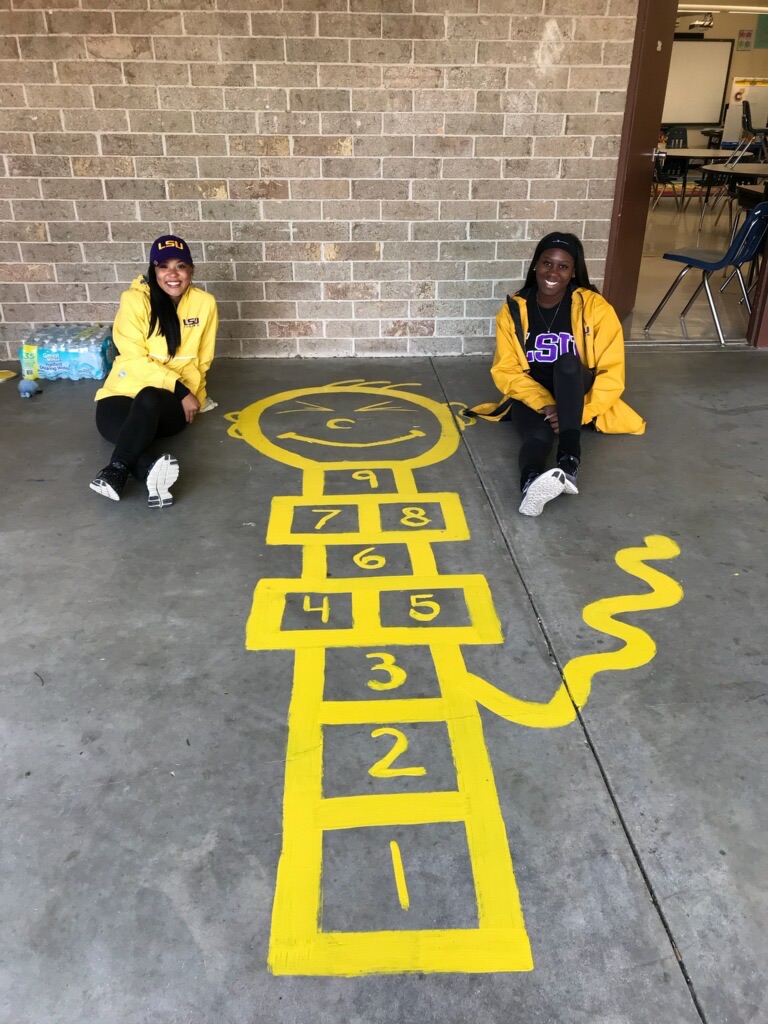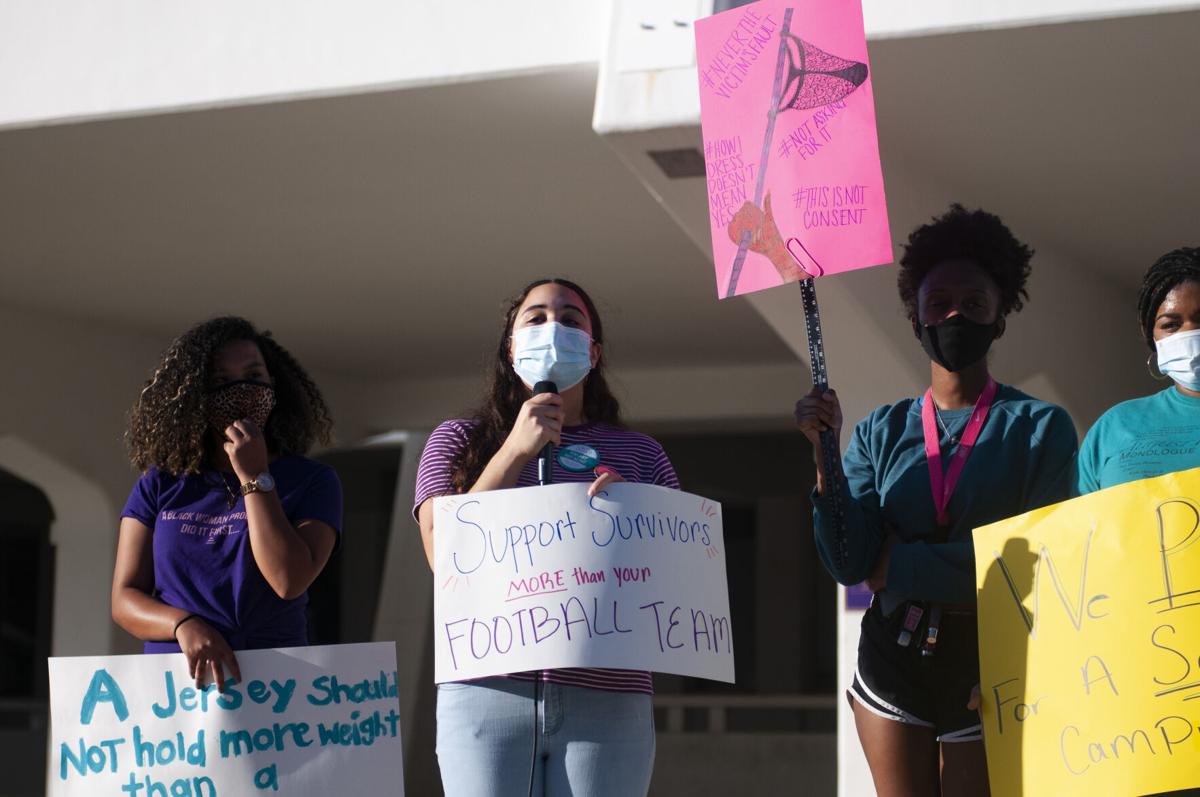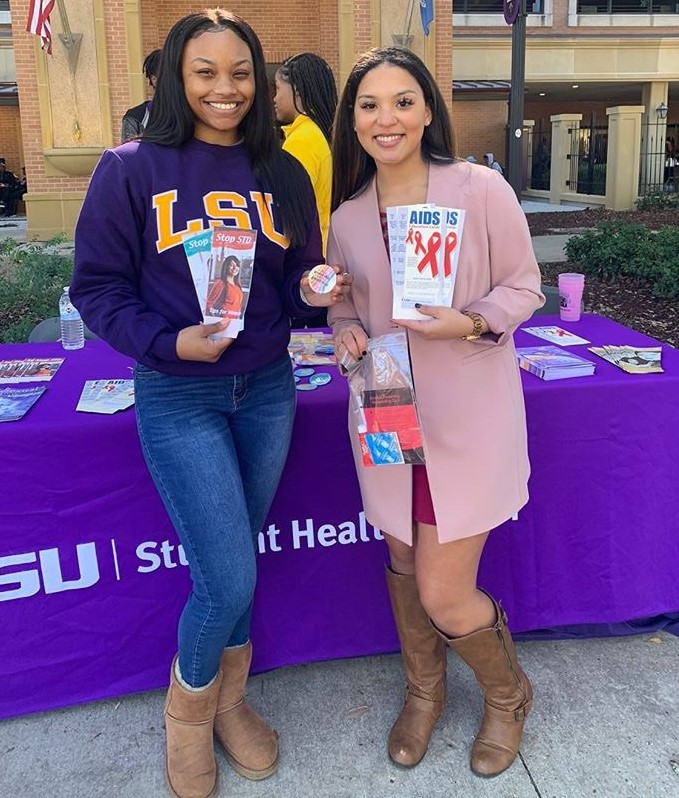ECP Service Dossier Spotlight Series: Alaysia Johnson, Spring 2021

CCELL: In your own words, what is an Engaged Citizen?
Alaysia: To me, I think an engaged citizen is just somebody who really immerses themselves in the community and makes the community’s struggles and victories their business. I think an engaged citizen is really someone who takes it upon themselves to enhance the wellbeing of those around them and uses the stakeholders in the community to create a lasting impact and uplift the community as a whole.
C: How did you get started working with the Engaged Citizens Program?
A: I went on a service trip to Africa in 2018 with Caleb Wells, who works at Campus Life and he started talking to me about the [Engaged Citizens] program. He thought [the Engaged Citizens Program] would be a great way for me to challenge my leadership and do more service that works with what I am learning and studying at LSU, while staying centralized in the LSU community. I started looking into the program and I found it was a great fit for me. A lot of the leaders that they had in the program had similar interests to mine. [So,] I went to an interest meeting, and it sounded perfect! It just seemed like a great idea to find something that combines my passion for service and also my other passions, which are mass communication and political science.
C: Where in Africa did you go, and what did you do when you were there?

This photo was taken before COVID-19 restrictions. Photo Submitted by Alaysia Johnson.
A: We went to Ghana, and we were there for two weeks. I have never experienced anything
like that, but it was amazing! We helped with this organization called the Cheerful Hearts Foundation; they immerse the students there and get them more excited about learning. They help
them read, they [teach students] how to write, and they just enhance what is already
there. While I was there, I taught two 5th grade classes; I taught English and government,
but it wasn't US government – obviously. It was Ghana's government and politics. I
think I learned more than I taught them because they're just really amazing kids!
We also helped put down cement at the facility where they let the students come and
read and do their homework after school. LSU sends people usually every year, so the
group that came before us had put the bricks down and when our group came, we were
pouring cement and making the concrete area where students can work. I really loved
Africa, and I would probably go back!
C: How did you first get involved with volunteering and service?
A: When I first came to LSU, I had a hard time finding my place because [LSU] was so big; I didn't have any friends, so I started doing service with my roommate. We started going to these elementary schools through Volunteer LSU. They used to have this program called Community Bound, and we would travel to different elementary schools and do upkeep and help refurbish the schools. That was really my first exposure to service at the college level. Doing that got me more involved with education. I ended up at Merrydale Elementary, and that is where the bulk of my service at LSU came from. I ended up creating a relationship with those children there, and I moved on from just working on the beautification of that campus to working inside with the students. I volunteered with Volunteers in Public Schools (VIPS) and that program also helps with literacy and the retention of students in East Baton Rouge Parish. I worked with Merrydale 1st and 2nd graders, and I had the same kids for about two years. I started developing a passion for working with kids in the education system and trying to reform policy there.
C: What do you enjoy most about volunteering?
A: You know, a lot of people think service is about you helping others in the sense that you are supposed to help make them better, and that is not how I handle service. I think it is more about what you pour into the community and what they pour back into you. I think I learned that at Merrydale, and then that went with me to Africa. That connection and that dual exchange between community and individual is absolutely my favorite part of service.
C: Did you have to adjust your service in the community because of COVID-19? If so, how?
A: This year what I have mainly focused on because of COVID is that service doesn't necessarily have to be physical acts of kindness -- that's what really changed. It wasn't safe for us to go out in the community, but I think people everywhere still needed service. It wasn't safe for us to go out in the community, but I think people everywhere still needed service. I adjusted my service, and that came in the form of me checking up on my peers, or having contactless supply drives, or just simply encouraging people and giving them access to vaccines and information. I did shift a lot of my service to be more virtual and to help others who necessarily did not always come to mind when I thought of service. I think a lot of people think you need to help the less fortunate when you do service, and that is completely not true. I think this year tested that because we all needed some form of help. I volunteered with Sexual Trauma Awareness and Response (STAR) in Baton Rouge, and I did virtual work that came in the form of social media, graphics, and helping get the word out about their programs and resources. I did have to shift, but I don't think it took away from the value of the service.
C: What have you learned about the community that you serve as they responded to the COVID-19 pandemic?
A: I think we are more resilient, and we are stronger than people give us credit for. I think especially with most of my work being with the black community—whether it was the African community or at Merrydale Elementary (which is a predominantly black school in East Baton Rouge)—I learned that our community is very, very strong, and we always adapt. I think what I really learned from COVID is that we must be patient with ourselves and patient with our community. It is so easy to think, "I want to fix something today," but I think COVID really taught us that we have to take things one step at a time and be patient with the outcome. I learned that you need to meet people where they are, and one of the most important values of service is listening and growing together.

Photo Submitted by Alaysia Johnson.
C: Why did you choose to take service-learning classes—since your political communications curriculum does not require it?
A: My first service-learning class was my sophomore year. I took an English [2000]
course that was focused on writing for community advocacy [taught by 2020 S-L Outstanding Faculty Award Winner Sharon Williams]. In that course, I worked with Connections for Life, which is an organization that
is right on Highland Road outside of LSU that rehabilitates formerly incarcerated
women back into society. Through that program, I was able to look at how my studies
concentration fit within the "real world." I am a Political Communications major at
the Manship School of Mass Communication, and that deals with policy and looking at
how communication and people are affected by policy.
Oftentimes, I think college students get stuck in this little bubble where you know
everyone around you, but you forget about those who are beyond the campus. Being able
to go into the community and meet people who were just so passionate and so amazing
really made me think about how my schoolwork and how my future endeavors with politics
can really shift the culture and shift the community. I think what I really got out
of service-learning was learning about how I personally could impact individual people
and seeing how something that I did in class could impact the organization and the
people inside. In our class, we had to learn to market their organization and change
how they can highlight their women better. My team created a website [for Connections
for Life], and they ended up adopting some of the pieces that we had created. Although
it might seem like something very simple, it can really impact the organization. That
happened in a class I took, but I still work with Connections for Life today!
I believe that you cannot advocate on behalf of a community that you do not represent or that you are not somewhat connected to. I think I learned more about how community advocacy really depends on the community and how your service goals will shift depending on who they are and what they need.
C: What did you most enjoy about the S-L contract option experience for both MC 3333: Multiculturalism and Media and MC 3505: Media & Policy Processes? You were partnered with Sexual Trauma Awareness & Response (STAR) for these courses; how was that?
A: When I first got to work with STAR, I had no idea what the year had in store for that program. It ended up being much bigger than my own self and my work within that organization. Originally, I was supposed to just create content that I thought my peers wanted to see and work with their high school groups to create new content to help get out the message about their resources. Unfortunately, LSU's sexual assault allegations [were publicized] in a huge USA TODAY article, so then my concentration in that organization started to shift. I feel that it was probably one of the most important pieces of work I have done at LSU because we got to shift the conversation from it just being me working with STAR, to me using my new knowledge in working with student organizations, to me working with groups like student government, to then implementing policy and talking to the university administration to what we are perpetuating on campus. Again, I got to use the service and the opportunities I learned at STAR and put them into practice at LSU.
I think with multiculturalism, you have to look at how messages are impacting the community. How LSU handles sexual assault and how that translates to the victims, students, and the organizations on campus, and how LSU is implementing [policy] was something that multiculturalism really touched on because you must look at the intersectionality of messages. What I really learned from STAR in my multiculturalism course is how the intersectionality of messaging and of groups can really impact how policy is perceived and how it is implemented into society. It was very cool to see and very important work to see how the message needs to shift.
I also had conversations about how the University ignores Black women in our unique experience and identity on campus; so in how [the university] handles sexual assault [made us realize] there are many Black women on campus that face this issue but do not have the spotlight or the interest of university officials or publications. We don't have anyone to turn to, because we don't have people in the Title IX office who look like us. Or, we don't have any Black professors to talk to where we feel comfortable with [them], so I think learning the tools from this actual program with STAR and being able to put it into practice was very useful in helping me with my career and my ideology as a public servant.

This photo was taken before COVID-19 restrictions.Photo Submitted by Alaysia Johnson.
C: Do you think that you will continue to implement service-learning and volunteering in your future endeavors?
A: I think what I really learned here at my time in LSU, even before I was in the Engaged Citizens Program, but now more so from the experiences I have had in the program, is that service will always be a part of me. I know 100% that I have to keep engaging in the community because, again, you cannot serve someone's [community] that you are not a part of. I think it makes you more passionate, and it can only fuel what comes out of that, so I think service will always be a part of what I do. I think that was my entire being at LSU; all of my academic work, all of my service, and all of my organizations have revolved around a service component—whether that was giving back to the community, making space for others, or leaving LSU better than when I came here.
C: What would you say to incoming LSU students to inspire them to participate in service-learning?
A: I would say bloom where you are planted. Like I said, when I first came here, I didn't know anything about Baton Rouge, and because I've really taken the opportunity to participate in service, I think I got out of [my time at LSU] what I put into it. I think the same can be said for anyone starting here on campus. Obviously, this isn't the same type of experience that freshman would have hoped for but you can make the best out of any situation as long as you keep an open mind. So again, I would just say bloom where you are planted.
Take an opportunity to look around you in Baton Rouge (not just at LSU), and look at what you want to change or who you want to be, and try to implement that into your life here.